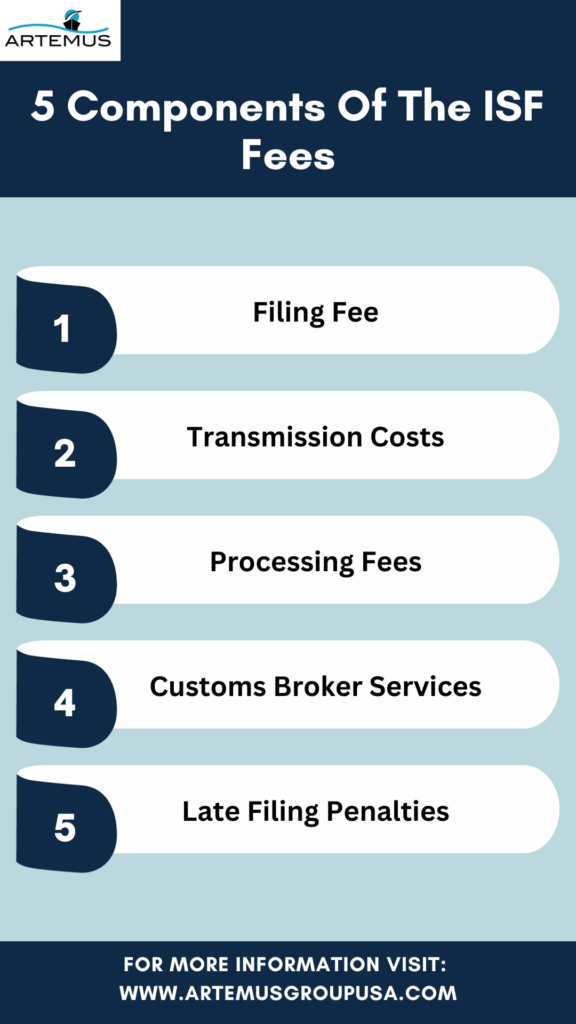
What Is Inbound Logistics & Outbound Logistics? A 2025 Guide
In the dynamic world of supply chain management, understanding the nuances of inbound and outbound logistics is crucial for operational

When it comes to navigating the complexities of international trade, importers are well aware that compliance is paramount. Among the multifaceted regulations that govern cross-border operations, Importer Security Filing (ISF) fees hold a pivotal role. These fees aren’t just financial transactions; they are the linchpin of ensuring a seamless and efficient importation process.
In this blog, we embark on a journey to unravel the intricacies of ISF fees and provide importers with the vital knowledge they need. We’ll explore the factors that can influence these fees and underscore the significance of timely compliance.
Furthermore, Artemus Transportation Solution offers a leading ISF software solution for compliance. With this, the ISF process becomes a breeze, guaranteeing accuracy and a hassle-free experience for importers. Let’s delve into the world of ISF fees and discover the innovative solution that is Artemus Transportation Solution.
Table Of Contents
Import Security Filing (ISF) fees are a vital component of international trade, serving to uphold security measures and ensure compliance with U.S. Customs and Border Protection (CBP) regulations. Essentially, ISF is a mandatory filing requirement that demands importers provide specific details about their shipments before they arrive in the United States. These details include information about the goods, their origin, and the parties involved in the transaction.
The ISF program, also known as the “10+2” rule, mandates the submission of ten data elements by the importer and two additional data elements by the carrier. These elements collectively form a comprehensive picture of the incoming cargo, enabling the CBP to assess security risks and enhance supply chain security.
ISF fees are the financial aspect of this regulatory process. They play a crucial role in sustaining the CBP’s efforts to scrutinize and secure the global supply chain. These fees encompass various components, including processing fees to cover administrative costs, penalty fees for non-compliance or inaccuracies, consultation fees for expert assistance, and government fees supporting security initiatives.
Timely and accurate payment of ISF fees is paramount for importers. Failure to comply can result in penalties, delays, and potential disruptions to the supply chain. ISF fees, therefore, go beyond being a financial obligation—they represent a commitment to the security and efficiency of international trade
Related: How To Check ISF Filing Status? A Step-By-Step Guide

Understanding the breakdown of Importer Security Filing (ISF) fees is crucial for importers navigating the intricacies of international trade compliance. The ISF fees consist of five key components, each playing a specific role in facilitating secure and streamlined cross-border transactions.
The filing fee is an integral component of ISF fees and covers the cost of submitting the actual Importer Security Filing. This filing is a mandatory requirement for cargo shipments destined for the United States.
The fee is essential to initiate the ISF process, allowing customs authorities to receive advance information about the incoming cargo. Accurate and timely submission of the ISF is crucial for compliance with U.S. Customs and Border Protection (CBP) regulations.
Importers must ensure that this fee is included in their budget, as it is a fundamental aspect of the importation process.
Importers may incur expenses associated with the transmission and submission of ISF data to CBP. This component covers the costs related to electronic data interchange (EDI) or other means of data transmission to provide CBP with the required information.
Reliable data transmission is essential for the accuracy and timeliness of ISF submissions, as it allows customs authorities to assess and process cargo shipments effectively.
ISF fees can include processing costs, which involve the review and validation of the submitted ISF information. These fees are associated with the administrative tasks performed by customs brokers or service providers to ensure that the ISF data complies with CBP regulations.
Processing fees support the meticulous examination of the data, including cross-referencing it with customs and trade databases to prevent errors and discrepancies that could lead to non-compliance issues.
Importers often opt to engage customs brokers or third-party service providers to assist with ISF compliance. These services can encompass various aspects, including data submission and compliance support.
Customs brokers play a crucial role in ensuring that the ISF is accurately prepared and submitted in a timely manner. Their expertise in navigating complex customs regulations and maintaining compliance is invaluable in the importation process.
While not initially included in the ISF fees, late filing penalties are a consequential aspect of ISF compliance. If the Importer Security Filing is not submitted to CBP within the specified time frame, significant penalties may be imposed.
Importers must be acutely aware of these potential penalties, which can result in financial repercussions, cargo delays, and compliance issues. To avoid such penalties, importers must prioritize timely and accurate ISF submissions, making them an essential part of the ISF compliance process.
Related: ISF Late Filing Fee: Exact Cost & 6 Tips To Manage Appeals
Understanding when and how to pay Importer Security Filing (ISF) fees is a critical aspect of navigating the intricacies of international trade. Here’s a comprehensive guide on when and how to pay ISF fees:
Timing is crucial in the world of international trade, and understanding when to pay Importer Security Filing (ISF) fees is pivotal for a smooth and compliant cross-border journey.
1. At The Time Of Filing: ISF fees are typically due at the time of filing the Importer Security Filing. Importers must ensure that these fees are paid before or during the submission of their ISF to the U.S. Customs and Border Protection (CBP). This proactive approach helps avoid delays in cargo clearance.
2. Before Arrival Of Goods: To prevent disruptions in the importation process, it’s crucial to pay ISF fees well in advance of the goods’ arrival at the U.S. port. This ensures that all financial obligations are met before the cargo reaches its destination.
3. Early Planning: Proactive planning is essential. Importers should budget for ISF fees as part of their overall shipment planning process. This includes considering the fees as part of the overall cost structure and ensuring that funds are allocated accordingly.
Embarking on the journey of international trade requires a nuanced understanding of Importer Security Filing (ISF) fees. Learn how to navigate this financial landscape with precision, ensuring timely and accurate payments to facilitate a seamless flow of goods across borders.
1. Electronic Payment: The most common and efficient method of paying ISF fees is through electronic means, such as Electronic Funds Transfer (EFT) or Automated Clearing House (ACH) payments. The CBP encourages electronic payments for their speed and accuracy.
2. Customs Broker Assistance: Customs brokers play a crucial role in the ISF process. They can assist importers in handling ISF fees, guiding them through the payment process, and ensuring that all financial aspects are accurately addressed.
3. Payment Methods & Channels: ISF fees are typically paid through the Automated Broker Interface (ABI), which is the CBP’s electronic system. Importers may need to provide specific details about the transaction, such as the Importer of Record (IOR) number and the bill of lading number.
4. Stay Informed: Keeping abreast of the current ISF fee payment processes and any changes in regulations is crucial. Regulations can evolve, so staying informed ensures that importers are well-prepared to fulfill their financial obligations accurately and on time.
5. Plan For Potential Delays: While electronic payments are generally efficient, it’s wise to initiate payment well in advance of the filing deadline. This accounts for any potential technical issues or delays that may arise.
6. Maintain Payment Records: Importers should maintain meticulous records of their ISF fee payments. These records serve as proof of compliance, assist in tracking financial obligations, and can be valuable in resolving any disputes or discrepancies that may arise.
Related: ISF Bond Cost Breakdown & Management For Import Success
Here are the key factors that can affect the amount of Importer Security Filing (ISF) fees
The total amount of ISF fees can increase with the number of ISF filings made. Each unique shipment or cargo container typically requires a separate ISF filing, and these filings may accrue higher fees for importers.
The complexity of the cargo and the associated data can significantly impact ISF fees. More intricate shipments with multiple commodities or high-value goods may require more detailed and comprehensive information in the ISF. This complexity can lead to increased fees as it necessitates more thorough data handling.
The customs broker or third-party service provider you select can influence ISF fees. Fee structures and pricing models can differ among service providers. Various service providers may have distinct approaches to fees and pricing.
It’s essential for importers to understand and agree upon the fee arrangement with their chosen provider, as this can affect the overall cost of ISF compliance.
Timely filing and strict compliance with U.S. Customs and Border Protection (CBP) regulations are critical factors affecting ISF fees
Failure to submit the ISF on time or inaccuracies in the data can result in late filing penalties. Avoiding such penalties is essential to keep ISF fees in check and maintain cost efficiency.
Ensuring the accuracy and completeness of the ISF data is crucial. Inaccurate or incomplete information may lead to data correction fees or require rework, both of which can add to the overall ISF fees. Importers should prioritize data accuracy to prevent unnecessary costs.
Related: Late ISF Filing: What To Do If Missed The Deadline?
Artemus emerges as the premier ISF (Importer Security Filing) software solution, offering an all-encompassing answer to compliance needs in international trade. Its user-friendly interface, robust features, and seamless integration with customs processes make it a standout choice for importers seeking efficient and accurate ISF submissions
Artemus simplifies data entry, validation, and transmission, reducing the risk of errors and late filing penalties. With Artemus, compliance is not just a goal; it’s a guarantee, ensuring a smooth and cost-effective importation process.
Related: When Does ISF Need To Be Filed? Know The Deadline
The information needed for ISF (Importer Security Filing) includes details about the shipper, consignee, cargo description, and more.
Failure to file ISF (Importer Security Filing) can result in penalties, delays, and cargo holds by customs authorities.
An ISF info sheet typically contains essential details about the shipment, including cargo descriptions, parties involved, and shipment particulars, to facilitate the ISF filing process.

In conclusion, navigating the realm of Importer Security Filing (ISF) fees is not merely a financial obligation but a critical aspect of ensuring the integrity, security, and efficiency of international trade. The intricate dance of compliance, timely submissions, and accurate payments are fundamental to the seamless flow of goods across borders.
ISF fees, encompassing processing fees, penalty fees, consultation fees, government fees, service fees, and amendment fees, represent more than just monetary transactions. They embody a commitment to collaboration between importers, customs brokers, and regulatory authorities to fortify the global supply chain.
The timely payment of ISF fees is a strategic move, ensuring not only compliance with U.S. Customs and Border Protection regulations but also the prevention of costly delays, penalties, and potential disruptions to the supply chain.

In the dynamic world of supply chain management, understanding the nuances of inbound and outbound logistics is crucial for operational

In today’s interconnected world, businesses rely heavily on global trade to expand their markets, access new resources, and drive growth.

Importing goods for resale in the USA presents a lucrative business opportunity, but navigating the complexities of U.S. customs regulations,
Get In Touch
Artemus’ Software Solutions for ISF, AMS, Japan AFR, eManifest Canada, & Panama B2B filings.